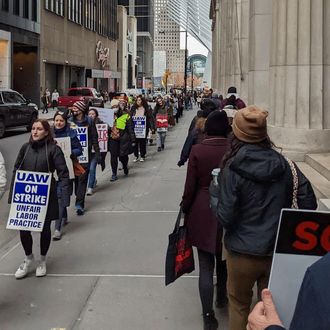
The most compelling story in publishing this fall isn’t the latest literary sensation or a gossipy celebrity memoir. It’s 250 employees at the second-largest book publisher in the country going on strike to demand a fair contract.
Members of the HarperCollins Union under UAW2110 across editorial, sales, publicity, design, legal, and marketing voted to strike indefinitely beginning November 10, following 11 months of failed negotiations with management. Workers are still pushing contract proposals for higher pay, more union security, and codifying diversity protections. HarperCollins is currently the only major publisher with unionized employees.
It won’t surprise you to hear that money, or the lack thereof, is at the heart of these contract negotiations. “There’s no money on the table. That’s why we had to strike,” said Laura Harshberger, a senior production editor and union chair who sits on the negotiating committee. “Our proposal right now would only increase payroll by less than a million dollars in the first year. Management’s proposal is only $14,000.” In the third quarter of 2022, ending September 30, the company’s earnings were $39 million. The million dollars needed for 2023 payroll increases is less than a conservative imprint of HarperCollins (the company is owned by the megacorporation News Corp., owner of Fox News) paid for Jared Kushner’s 2022 book advance. The starting salary at HarperCollins is $45,000 per year pretax.
HarperCollins stated via email that it would not engage in further bargaining sessions.
On Monday afternoon, I watched employees march in front of the HarperCollins office, chanting and ringing bells while holding signs that read “PASSION DOESN’T PAY THE BILLS.” It was thrilling to see HarperCollins employees saying the quiet parts out loud, as I recently left book publishing after nearly a decade due to so many of the things the HC Union is fighting to improve — low salary, long hours, limited opportunities for promotion. For too long, book publishing has used the “a million recent college grads would kill for that job” trope as an excuse to underpay and overwork its employees. If there’s another liberal-arts or Ivy League grad with an undying love of Toni Morrison or Judy Blume waiting in the wings to work around the clock for paltry paychecks, why pay more to hire or keep employees without a built-in safety net?
“In order to truly address issues of inequity in the industry, everybody has to make a living wage,” said Harshberger. She noted how many union members are forced to work a second job — ranging from “freelance work, work in bookstores, work retail” — all to stay at the publishing company.
“The conditions are a lot harder when you’re living them than they are when you have the piece of paper with the offer letter,” Sophie Schmidt, an editorial assistant at HarperCollins said. “You’re told that if you just work really hard, you can do it. But then you have to live the reality of living on $45,000 pre-taxes in New York City.” The average cost of rent for a Manhattan apartment topped $5,000 per month in July 2022, and whether employees will have to return to the office has yet to be communicated by HarperCollins.
The striking workers aren’t hoping for glamorous media salaries like they depict in movies; they just want to have their basic needs met. “I just want to be able to go see my family for Christmas and Thanksgiving and go to the doctor when I need to,” Schmidt said.
It’s not just HarperCollins employees’ livelihoods at stake — an increase in pay at HarperCollins could improve life at the other publishing houses. (A box of croissants had arrived from friends at Penguin Random House that morning.) A few years ago, PRH raised its starting salary, and HarperCollins soon followed. “There would be a ripple effect if we had pay improved,” Harshberger noted. “There’s just no excuse for $45,000, and yet that is the standard across the entire industry. They have created this model where they underpaid people on purpose. ”
Many of HarperCollins’s own high-profile authors are standing with the union. “We have lunch lined up all week from HarperCollins authors,” Harshberger said, including a delivery from best-selling author Veronica Roth of the Divergent series. Angie Thomas (The Hate U Give) has been a vocal public supporter and one of the largest donors to the HarperCollins hardship fund, which is being used to pay those on strike while they’re out of work.
The reason for their support, along with that of literary agents, is simple. “If the editor on your book isn’t worried about making rent, they’re gonna do a better job editing your book,” said Stephanie Guerdon, a 32-year-old associate editor who has worked at HarperCollins for six years. “When you don’t have to worry about the absolute basics on the hierarchy of needs, you can do a better job and be happier and give more to your job.” She’d also like to live without a roommate at some point in her life, visit her family, and get Lasik so she can continue to read.
How the HarperCollins strike might affect other publishing houses is still unknown. Understandably, any union activity brewing at the other houses is tightly under wraps so as not to tip off management, but other publishing workers are watching this strike closely. “Everybody is so invigorated and cheering us on,” said Guerdon. “I have so many friends at different houses who are like, ‘I’m rooting for you.’”

